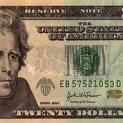Friday, November 9, 2007
The Empire's declining dollar.
Not great news for anyone.
by StFerdIII
Empire's run on prestige as much as reality. Having the world's reserve currency bestows many political and economic benefits on the empire. Being the world's reserve currency is an enabler, as well as a representation, of domination. Devaluing such an asset is not beneficial – for anyone.
Over the past 30 years the dollar weighted index has fallen from 100 in 1974, to 72 in 2007. This is a dramatic 28% drop in one generation. In 2001 the dollar index was at 110. In the past 5 years the dollar has dropped close to 40%. This is simply an unsustainable dollar devaluation crisis. If not arrested it will herald the end of American hegemony.
Empires run on coinage value. The Lydians circa 600 B.C. developed the first state coinage system – greatly facilitating trade and commerce. Ionian Greeks soon followed suit, building up a treasure trove of wealth as the medium of exchange and value, became standardized. Monetary value is the very basis of civilised commerce. The richest empires in history have proven that a robust and reliable currency unit is mandatory in running, and managing a far-flung empire. The Roman denarii, the British pound, even the Franc and Ruble, all have demonstrated the benefits of imperial monetary domination.
Maintaining a strong currency and reassuring the empire's citizens of its reliability, is a must for the imperial power. Allies and satrapies don't take kindly to devaluating assets or using a weak imperial currency. In times past debased currencies and economic chaos has led to many a war and rebellion against a weak imperial power.
By having the world put its cash reserves into your currency, instead of say gold or buying more sheep, the hegemonic power, receives 'seigniorage' or profit rent. As other countries buy your currency, you as the hegemon are able to run trade deficits, spend more than you invest, and manage currency relationships. The economic and politicial benefits of seigniorage are thus huge. As soon as this advantage is lost, the terms of power, and of trade swing against the hegemon.
Why has the US dollar lost 30% of its value over the past 30 years?
The reasons are varied but at the core are 3 issues. First the US is printing too much money. Second, fiscal improvidence, entitlement programs and subsidies are leading to budget deficits. Third, higher returns are being realised outside the US and these returns are not U$ denominated.
The Americans can address all three issues – and they should. First the money supply is growing by more than 10% a year – far in excess of economic growth [about 3% in 2007 overall]; inflation [2.2%] and population growth. In fact the printing of money is almost double what it should be. When too many dollars are printed and they are chasing a reasonably stable supply of products and services growing at 3-4% per annum, then currency deflation is the obvious result.
An increasing money supply compounds the existing problem of slowing US GDP growth. The Fed Reserve and others believe that by printing money they can liquidify the US markets and stimulate growth. This is true to a point. More significant would be to cut interest rates by another 0.25% to be in line with economic growth and inflation. The current US interest rate level, at 4.5%, is too high by 0.25%. Experts worry that by cutting interest rates further the U$ will fall faster. This is unlikely if the printing presses are turned off, and if economic growth rebounds as a result of the rate decline. The markets in bonds and 91 day T-Bills already expect a rate cut, so the U$ impact is already priced into market exchange rates.
By cutting rates further and stopping the printing of cash, the Fed Reserve would ensure that economic growth is above 3% per annum for 2008, thereby stimulating an increase in value in the US currency.
Third, the US neeeds to stop spending money on non-essential, non-miliatry programs. The military only takes 3.2% of GDP – about half of what is needed. Non-essential spending, including huge health care budget increases, a 50% increase in federal program spending for education, corporate subsidies; clean energy subsidies; pet projects; or the $280 billion agricultural subsidy bill, all need to be erased. By cutting just 10% of its massive $2.4 Trillion Federal budget, and by decreasing tax rates [marginal and investment], to stimulate more tax revenues, the US would have a $250 Billion surplus, within 6 months. The dollar would of course appreciate significantly on such news.
The dollar's decline is a symptom of imperial weakness. A dollar decline might benefit multi-national firms and exports; and decrease temporarily the trade deficit, but those benefits come at a huge cost. Inflation, rising oil and gold prices which are denominated in the U$, and most vitally, a decrease in hegemonic power, are the results of bad fiscal and monetary policy.
The U$ dollar's 30 year decline once again proves the folly of governmental and political posturing. Once the US dollar loses its status as the world's reserve currency, it will soon relinquish its imperial dominance. This is not a positive for anyone inside the US imperial system. Empires bring peace, prosperity and wealth creation. International economic chaos does not.